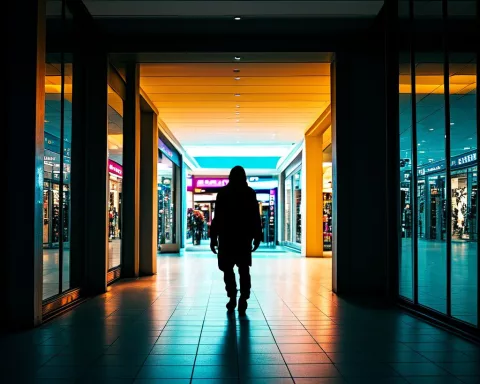South Africa is determined to combat unlawful commerce, with a recent successful operation led by the South African Police Service (SAPS) resulting in the seizure of nearly 40 kilograms of protected plants worth nearly R500,000. The SAPS strategic plan, “More boots on the ground”, incorporates various units within the SAPS and establishes a comprehensive safety and security network against illicit activities. Intensive patrols and increased visibility along the provincial borders have led to a drop in most crime categories, making South Africa a safer place to live.
South Africa continues to prove its unwavering resolve in the battle against unlawful commerce. A recent prominent victory for this cause was a successful operation led by the South African Police Service (SAPS) along the West Coast, featuring the seizure of nearly 40 kilograms of protected plants worth nearly R500,000. Their varied, integrated strategy in addressing illegal activities is resolute and their achievements, undeniable.
A Renewed Commitment in Combating Illicit Activities
South Africa continues to prove its unwavering resolve in the battle against unlawful commerce. A recent prominent victory for this cause was a successful operation led by the South African Police Service (SAPS) along the West Coast, featuring the seizure of nearly 40 kilograms of protected plants worth nearly R500,000.
This noteworthy success was a clear reflection of the SAPS’ strategic plan known as “More boots on the ground”. Far from being a mere attractive slogan, this plan indicates a strategic pivot towards a thorough, integrated method of crime prevention, specifically during the holiday season when unlawful activities often surge rapidly.
Coordinated Efforts in Crime Suppression
This cooperative initiative incorporates a host of units within the SAPS, such as the Provincial Traffic of various provinces, Local Municipal Traffic Officials, South African National Parks (SANPARKS), the Department of Home Affairs (Customs and Immigration Officers), and the Department of Forestry Fisheries and the Environment (DFFE), to mention a few. Collectively, they form a cohesive force against illicit activities, establishing a comprehensive safety and security network.
Sergeant Christopher Spies, the SAPS spokesperson, highlighted that these operations are not occasional but are carried out consistently throughout the year. Their goal goes beyond mere deterrence. They aim to supervise and manage highways, entry and exit points, with the intention of blocking the movement of illicit drugs, unauthorised firearms, illegal goods and stolen items.
Vigilant Monitoring and Crackdown on Crime
Over a recent four-day period, officials were intensely active. An astonishing total of 39,977 searches were conducted across the Free State, Eastern, Northern, and Western Cape. These comprised 24,025 individual searches, 10,337 vehicle searches, and 307 premises searches.
The results were profound, with 466 suspects arrested in Cape Town alone for charges related to murder, assault with intent to inflict severe bodily harm, sexual offences, illegal possession of firearms and ammunition, and traffic-related offences including drunken driving and reckless and negligent driving.
Lieutenant Colonel Malcolm Pojie detailed an additional clampdown on the drug trade, with a search of 75 residences leading to the arrest of 102 suspects. Moreover, during tracing operations, 25 wanted suspects were taken into custody.
Substantial Seizures and Successful Crime Deterrence
The seizures from these operations were significant. Over two million millilitres of alcohol, mandrax tablets with an estimated street value of R5,180, tik estimated at R5,040, dagga estimated at R1,224, and smaller amounts of khat, cocaine and ecstasy were confiscated. Firearms and ammunition were also seized.
Eminently, Sergeant Spies pointed out a considerable drop in most crime categories during the operation. He credited this decrease to intensive patrols and increased visibility along the provincial borders, which he believes have discouraged serious crime in neighbouring districts.
The unwavering commitment of these law enforcement agencies in their objective to safeguard South Africa’s inhabitants is unmistakable. Their varied, integrated strategy in addressing illegal activities is resolute and their achievements, undeniable.
Effective Collaboration Towards Crime Prevention
This real-time crime prevention strategy, where numerous agencies collaborate and pool resources, is showing effectiveness. It is this unified approach that allows South Africa to aim for a crime-free environment. This task may not be easy, but it is undeniably worthwhile.
In conclusion, South Africa’s robust stand against illicit trade, as demonstrated through these comprehensive, multi-disciplinary operations, is a testament to its unwavering commitment to law enforcement and public safety. As the country continues in its stride to protect its citizens, such coordinated efforts in crime suppression and prevention are key to a safer and secure environment.
1. What is South Africa’s approach to combat illicit trade?
South Africa has a strategic plan called “More boots on the ground” that incorporates various units within the SAPS to establish a comprehensive safety and security network against illicit activities. Intensive patrols and increased visibility along the provincial borders have also led to a drop in most crime categories.
2. What agencies are involved in South Africa’s coordinated effort against illicit activities?
The initiative incorporates a host of units within the SAPS, such as the Provincial Traffic of various provinces, Local Municipal Traffic Officials, South African National Parks (SANPARKS), the Department of Home Affairs (Customs and Immigration Officers), and the Department of Forestry Fisheries and the Environment (DFFE), to mention a few.
3. How active are officials in monitoring and cracking down on crime in South Africa?
Officials are intensely active and consistently carry out operations throughout the year. Over a recent four-day period, a total of 39,977 searches were conducted across the Free State, Eastern, Northern, and Western Cape. These comprised 24,025 individual searches, 10,337 vehicle searches, and 307 premises searches.
4. What were the results of these operations in South Africa?
A total of 466 suspects were arrested in Cape Town alone for charges related to murder, assault with intent to inflict severe bodily harm, sexual offences, illegal possession of firearms and ammunition, and traffic-related offences including drunken driving and reckless and negligent driving. Additionally, firearms, ammunition, and illicit substances were confiscated.
5. Has South Africa’s approach been effective in preventing crime?
Yes, there has been a considerable drop in most crime categories during the operation. This decrease is credited to intensive patrols and increased visibility along the provincial borders, which have discouraged serious crime in neighbouring districts.
6. What is the importance of South Africa’s coordinated effort in crime suppression and prevention?
Such coordinated efforts in crime suppression and prevention are key to a safer and secure environment. As South Africa continues in its stride to protect its citizens, this real-time crime prevention strategy, where numerous agencies collaborate and pool resources, shows effectiveness in aiming for a crime-free environment.












